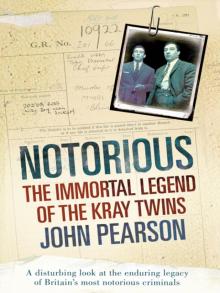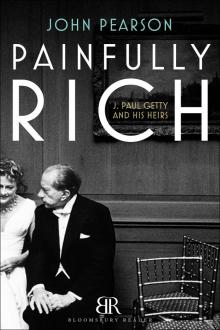- Home
- John Pearson
Painfully Rich Page 2
Painfully Rich Read online
Page 2
The human wreckage started piling up within the old man’s lifetime. One son had killed himself three years before he died. By then another son appeared intent on doing much the same through alcohol and heroin addiction. A third son, disinherited in childhood, had grown increasingly embittered at the way he had been treated by his father. Only the fourth and youngest son was currently enjoying what by normal standards one might term a reasonably fulfilling life – but at the cost of cutting himself off from anything to do with Getty Oil or his father’s other businesses.
By the time the old man died, the blight was starting to afflict the next generation too. Getty’s eldest grandson had been kidnapped by the Italian mafia, losing his right ear in the process, and then embarking on a life of drug addiction, drink, and dissipation which would end by almost totally destroying him. Later his sister would end up suffering from Aids.
Indeed, in the years following on Jean Paul Getty’s death, there were times when the family itself appeared intent on self-destruction, as brother battled through the courts with brother over this vast and poisoned legacy. As one journalist put it, by the 1980s the name of Getty had become ‘a synonym for family dysfunction’.
Great fortunes can clearly have disastrous effects upon the heirs – generally by swamping them with too much money at an early age. But with the Getty family, undiluted lucre was never at the root of all their misery. None of J. Paul Getty’s sons was raised in pampered luxury – nor even in the expectation of inheriting enormous wealth. Nor were the grandchildren. Rather the contrary.
Balzac, who was fascinated by great fortunes, and by the havoc that he saw them bring to the nouveaux riches families of France’s Second Empire, believed that, as he wrote, ‘behind every great fortune lies a great crime’.
But even here the Gettys would have baffled him. For although there may have been a modicum of dirty-work and double-dealing in the creation of the Getty fortune, there was no actual crime to put one’s finger on – and certainly no ‘great’ one.
There was, however, something more intriguing, which Balzac would have loved – the infinitely complex character of Getty himself. The story of his fortune is essentially the story of his life, and the contradictions and obsessions of this most eccentric Californian always played a crucial role in his achievement. They played an even greater part in the troubled heritage he left behind him, so much so that what happened to his children and his children’s children also forms a part of Jean Paul Getty’s legacy. Some were destroyed by it; some, though badly scarred, have come to terms with it; and some of the younger generation, all too well aware of what has occurred, are seeking to offset the dangers for the future.
How all this happened forms an extraordinary chronicle of the effect of vast amounts of money on a group of very vulnerable human beings. To understand it, one must begin with the strange creation of the fortune, and the character of the solitary, frightened, womanizing puritan who made himself the richest human being in America.
Part One
Chapter One
Father and Son
Jean Paul Getty was no novice to great wealth and the problems it could bring to its possessors. He was in fact a second generation millionaire himself – his father, George Franklin Getty, had started the family fortune with the profits from the Oklahoma oil boom of 1903. But just as with a great tree it is hard to picture the sapling out of which it grew, so the vastness of Jean Paul Getty’s fortune almost totally obscures the lesser fortune which preceded it. It also obscures the fact that without his father and his fortune, the Getty billions could never have existed.
When Jean Paul was already in his sixties, as rich as Croesus, and immensely proud to be sleeping with a duchess, with the sister of a duke, and with a distant cousin of the Tsar of Russia, one of his odder habits was to recite part of Lincoln’s Gettysburg Address, which he knew by heart, to those he particularly wanted to impress. On concluding, he would casually mention that Gettysburg happened to derive its name from an ancestor of his, one James Getty, who bought the site of the historic town from William Penn in person, and endowed it with his name.
It might seem odd that the richest American felt obliged to produce this sort of ancestral credit rating. What is odder still is that the story was totally untrue. Gettysburg got its name from a family called Gettys, and Jean Paul’s ancestors had no connection with the place at all.
More to the point, his father’s history, far from requiring enhancement with the sort of phony origins sometimes indulged in by the English aristocracy, was one of those tales of achievement of which any son, particularly an American, might well have been extremely proud. But then, Jean Paul had reasons of his own to feel ambivalent about his father – and the part their curious relationship had played in the whole bizarre creation of his fortune.
Jean Paul himself was born in Minneapolis in 1892. His father, George, a powerful, godly man, was thirty-seven at the time. His mother, Sarah, née Risher – dark eyes, tightly piled-up hair, and the down-turned mouth of the dissatisfied character she was – was three years older, of distant Dutch and Scottish origins.
The Gettys themselves originated from Northern Ireland, arriving in America at the end of the eighteenth century and going through the melting pot of the American immigrant experience. As a result, George began life as the offspring of poor farming folk in Maryland. His father died when he was six, leaving the boy to labour with his mother in the fields until his uncle, Joseph Getty, famous as a local hell-fire temperance preacher, sent him to school in Ohio.
George was a strong, hard-working boy and the adversity following his father’s death left him with an iron resolution to raise himself from poverty. Meanwhile from Uncle Joe he learned the rigid precepts of fundamentalist Christianity, together with a lifelong hatred of the demon drink, and a steadfast faith in the saving grace of God to lift humanity from poverty and sin.
It was while at Ohio University, and studying to become a teacher, that George first caught the eye of Sarah Risher. She had no intention of spending her life married to a schoolmaster, so she made George promise to become a lawyer – offering the money from her dowry to pay his fees through law school.
It is appropriate that Sarah Getty’s name is still enshrined within the massive trust which came to dominate the fortunes of her family, for throughout the marriage sharp-eyed Sarah was the mover, egging on her dutiful, hard-working, younger partner to make money and succeed.
Within a year of their marriage in 1879 George had already taken his law degree at the University of Michigan, and Sarah was urging their move to thriving Minneapolis – where her husband turned his legal talents to the insurance business and began to prosper. By their early thirties George and Sarah owned their own house in the most fashionable part of Minneapolis, drove a coach and pair, and were people of substance and promise in the booming capital of the North Star State of Minnesota.
Far from weakening their puritan ideals, success made both Gettys stronger in the faith. From puritan Uncle Joe, George had imbibed a Calvinistic sense of good and evil, and worldly wealth was seen as evidence of heavenly favour. According to this practical belief, God rewarded those who hearkened to his word – and smiled on those whose way of life forswore the devil and his works.
As zealous methodists, George and Sarah were serious and self-denying. Having signed the pledge in his early twenties, George remained a lifelong and dedicated teetotaller. And until the age of thirty-five, his life had seemed a story-book example of the benefits which flow from Christian conduct. He had responded to the word of God. He had laboured in the vineyard. Now the time had come for George, like Job, to face his period of tribulation.
When he was being hailed as his country’s richest human being, one of the few possessions Jean Paul Getty genuinely treasured was a sepia photograph of a small girl he had never seen. She had ringlets, a large bow in her hair, and soulful eyes.
This was his sister, Gertrude Lois Getty, who was born in 1
880, soon after George and Sarah’s marriage, and died in the typhoid epidemic which swept Minnesota in the winter of 1890, Sarah also caught this fearsome illness and, although she recovered, it gave her a tendency to deafness which steadily grew worse, making her virtually stone deaf at fifty.
For George and Sarah the taking of their only child, ‘the sunbeam of the family’, was a loss which tried their faith as Christians. Of the two, George appeared the more affected, and for a period he turned to spiritualism in an attempt to find his daughter, and underwent a deep religious crisis.
When he finally emerged from it, he was more steadfast in the faith than ever, and actually abandoned Methodism for the stricter creed of Christian Science, whose principles he adhered to firmly for the remainder of his life.
As if to show that God approved this change of creed, it was shortly afterwards that George received a sign. In her fortieth year Sarah, who had conceived but once before, discovered she was pregnant. And on 15 December 1892, the arrival of a son was like an early Christmas present to replace their daughter.
In their gratitude to God, how could the Gettys fail to treasure such a child? And George had further reasons for rejoicing in the newborn Jean Paul Getty. Here was an heir at last to carry on the name, and inherit what was steadily accruing from the lucrative insurance business in the thriving cities of the Midwest USA.
Sarah named the child after her husband’s Getty cousin, John, but it was very much in character that she also had to give the child a touch of European sophistication by making the name not ‘John’ but ‘Jean’. With time the name would be compressed to the bare initial, J. in J. Paul Getty, and within their family its owner would be generally referred to by the name of Paul. But there was something more prophetic than Sarah can have realized when she gave her child this personal connection with Europe. Europe and its culture were to act as magnets to her son and many of the members of his family in the years ahead.
Despite the Gettys’ middle-class prosperity, life with two straitlaced, ageing parents, haunted by a vanished daughter, offered little in the way of sociability or mirth, and Paul, though cosseted and protected, had a lonely and loveless childhood. His mother actively discouraged contact with other children from fear of fresh contagion. And while over-protective with her son, she was careful not to show him too much love in case she lost him as she lost his sister.
Years later Paul told his wife that as a child he was never cuddled – nor did he have a birthday party or a Christmas tree. His one great interest was his postage stamp collection, his closest friend a mongrel dog called Jip.
Undoubtedly this claustrophobic childhood put its mark on him, and he would always be a loner, wary of his fellows, and keeping his thoughts and feelings to himself.
‘I have long been able to exercise a considerable degree of control over my display of emotions,’ he proudly wrote when he was over eighty.
But in childhood, the tedium of life in this rigid little family clearly affected him in other ways as well. Instead of passively accepting the grey horizons of nineteenth-century puritan America, he secretly rebelled, and throughout his life, part of him would always struggle to escape the boredom and restriction of humdrum domesticity. He would never be entirely at ease within a family. Instead he would be always on the move, and until the onset of old age would never settle anywhere for long. Left to his own devices, Paul Getty would have been a wanderer.
With business booming, God appeased, and his home in Minneapolis in order, George Franklin Getty had every reason to be happy – particularly when he suddenly received a further sign of heavenly approval.
In 1903, when Paul was ten, the Lord directed George to Bartlesville, a one-horse town in what was legally still Indian Territory in Oklahoma, to settle an insurance claim. At the time he had no way of knowing the stupendous outcome of this unexciting journey. Bartlesville was buzzing with the beginnings of the Oklahoma oil bonanza. Under this barren landscape lay some of the largest oil reserves within the USA. And George had arrived just in time to benefit from them.
‘There are men,’ wrote his son, ‘who seem to have an uncanny affinity with oil in its natural state. I am inclined to think that my father had a touch of this himself.’
Perhaps he had, but, to start with, it was little more than passing speculation that led George to invest 500 dollars in ‘Lot 50’ – a lease to the oil rights on 1,100 acres of virgin prairie outside Bartlesville.
But the Lord had directed George aright. When drilling started on Lot 50 that October, it almost instantly struck oil, and one year later, George had six oil wells in production. The price of crude was 52 cents a barrel at the time and Lot 50 was averaging 100,000 barrels every month.
Apart from heavenly guidance, there were more prosaic factors to George’s rapid creation of a fortune. He had already saved considerable reserves of capital from the insurance business; he knew the law; and he conducted his affairs the honest and self-denying way.
Within the next three busy years, George propelled his company, which he called Minnehoma Oil (a name concocted, not from some romantic redskin maiden, but from the businesslike elision of the two words Minnesota and Oklahoma), into a thriving company. By 1906, George Getty was a millionaire.
Chapter Two
A Solitary Childhood
Paul Was Ten when he arrived in Bartlesville and got his earliest glimpse of George’s famous ‘Lot 50’ oil well. He was deeply disappointed. Knowing that Bartlesville was in Indian territory, he had gone there expecting redskins, squaws and wigwams. Instead he saw a makeshift boom-town, reeking of oil, and peopled with men in grimy overalls.
But it was a formative experience for any boy to watch his father suddenly grow rich so very easily and something he would not forget. Having this intimate entrée to the oil business, it would not be difficult for him to do the same – should he ever need to. And from the start of Minnehoma, George took it for granted that his son would naturally join him in the company and ultimately succeed him at its head. He even encouraged his infant son to use his pocket money to buy two Minnehoma shares.
‘Now I have to work for you,’ he told him, handing him the share certificates. George had a habit of dispensing nuggets of his homespun wisdom. ‘A businessman is only as good as his sources of information,’ was one of them. ‘Let your deeds speak louder than your words,’ another.
But throughout childhood and adolescence, Paul stayed obtusely uninspired by his father’s words – and by the oil business, having interests of his own to occupy his time.
Later in life, he would always speak of George with considerable piety and reverence. ‘He was a great man, and a genuine philosopher,’ he solemnly intoned. ‘He taught me everything I know.’
In fact Paul taught himself everything he needed, and father and son would often clash with one another. According to his cousin, Hal Seymour, ‘Paul and his father just seemed to get in one another’s way when they were together in the house.’
In character Paul was closer to his mother than to solid George. He had inherited her down-turned mouth, her restlessness, her locked-in nature; then, as he grew, a further similarity revealed itself between them. Sarah’s deafness made her particularly isolated, and Paul began to emulate her solitariness. Even his voice would bear the traces of their close relationship. The measured diction that became a sort of Getty trademark was something that he learned from talking with a mother who was hard of hearing. And like his mother, he increasingly relied upon his own company. It was now that Cousin Hal remembered him as being ‘exceptionally solitary, even for an only child’.
Unlike his parents, he found little pleasure in the joys of Christianity; his one true passion was for reading. By the age of ten he had discovered those works of G. A. Henty which he would be enjoying in his eighties.
As a boys’ adventure writer Henty had inspired a generation of Victorian schoolboys, transporting them from the boredom of the dusty schoolroom to the most colourful periods o
f history, peopled with its most exciting characters. Under Drake’s Flag, With Clive in India, With Moore at Corunna: even the titles were an invitation to a solitary only child to escape from a closed-in Christian home in Minnesota to the richer, more exciting world outside.
Now that George was rapidly becoming rich, and was frequently away in Oklahoma, Sarah decided it was time for one more move – from the flat farmlands and freezing winters of Minnesota to sunny California. She claimed her health was delicate, and that she needed warmth and a change of scenery. As usual, George agreed with her.
After visiting San Diego, which they thought provincial, the Gettys decided on a plot of land on newly laid-out South Kingsley Drive, on a corner with the still unsurfaced stretch of Wilshire Boulevard lying beyond the Los Angeles city limits. There they built themselves a house.
As a family the Gettys had few close friends and the move had cut them off from those they had. They drank not, neither did they sin – and Sarah’s growing deafness heightened the sense of isolation of the family. In the days before efficient hearingaids, it was hard for any family with a mother suffering this most antisocial of afflictions to be open and at ease with those around them. So more than ever now the Gettys were thrown back upon their own resources. They were self-sufficient and reclusive people. These were habits Paul learned early, practised all his life and passed on to his children.
George tried to be as strict with his son as with himself, but the more exacting George became, the more sullen was his son’s reaction. He was wilful, as solitary children often are; and George, as parents often do, imagined that the cure was discipline. So, shortly after moving to Los Angeles, Paul was sent as a day boy to the local military school – which inevitably he hated. Drill, marching, uniforms and discipline were not for him. He stayed for nearly four years, acquired few friends, showed zero aptitude for soldiering, and when he finally escaped was grateful for the peace and privacy of his own room in the house at South Kingsley Drive.

 The Bellamy Saga
The Bellamy Saga Notorious: The Immortal Legend of the Kray Twins
Notorious: The Immortal Legend of the Kray Twins Learn Me Good
Learn Me Good James Bond: The Authorised Biography
James Bond: The Authorised Biography Painfully Rich
Painfully Rich The Profession of Violence
The Profession of Violence Biggles
Biggles Blood Royal: The Story of the Spencers and the Royals
Blood Royal: The Story of the Spencers and the Royals